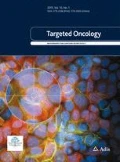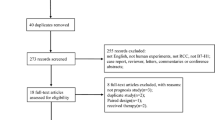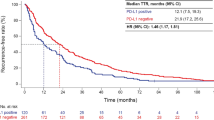Abstract
Background
Several clinical trials have reported that therapies targeting programmed death-1 (PD1) and its ligand (PD-L1) improve patient outcomes, while tumor response has been related to PD-L1 expression.
Objective
To investigate the prognostic role of PD-L1 expression in patients affected by renal cell carcinoma (RCC).
Methods
MEDLINE/PubMed, the Cochrane Library, and ASCO University were searched for studies investigating the prognostic role of PD-L1 expression in RCC. Data extraction was conducted according to the Preferred Reporting Items for Systematic Reviews and Meta-Analyses (PRISMA) statement.
Results
Six studies and 1323 cases were included in the final analysis. PD-L1 was expressed in 24.2 % of clear cell tumors compared to 10.9 % of non-clear cell tumors (p = 0.002). In the overall population, a higher level of PD-L1 expression increased the risk of death by 81 % (HR; 1.81, 95 % CI 1.31–2.49; p < 0.001). When the analysis was restricted to cases evaluated by immunohistochemistry alone, the higher expression of PD-L1 more than doubled the risk of death (HR; 2.05, 95 % CI 1.38–3.05; p < 0.001). In clear cell histology, higher PD-L1 expression increased the risk of death by 53 % (HR; 1.53, 95 % CI 1.27–1.84; p < 0.001), while in metastatic patients, the evaluation of PD-L1 expression on primary tumors revealed that it retains its prognostic role (HR; 1.45, 95 % CI 1.08–1.93; p = 0.01).
Limitations
Significant heterogeneity has been identified among the included studies. As a consequence, cautious interpretation of the results is recommended.
Conclusion
This meta-analysis indicates that a higher level of PD-L1 expression is a negative prognostic factor in RCC. Its validation as an independent prognostic factor compared to other traditionally used clinical parameters in localized or advanced disease is recommended.



Similar content being viewed by others
References
American Cancer Society (2013) Cancer Facts & Figures 2013. American Cancer Society, Atlanta
Ferlay J, Steliarova-Foucher E, Lortet-Tieulent J, Rosso S, Coebergh JW, Comber H et al (2013) Cancer incidence and mortality patterns in Europe: estimates for 40 countries in 2012. Eur J Cancer 49:1374–403
Bray F, Ren JS, Masuyer E, Ferlay J (2013) Estimates of global cancer prevalence for 27 sites in the adult population in 2008. Int J Cancer 132:1133–45
Iacovelli R, Sternberg CN, Porta C, Verzoni E, Braud F, Escudier B et al (2015) Inhibition of the VEGF/VEGFR Pathway Improves Survival in Advanced Kidney Cancer: A Systematic Review and Meta-Analysis. Curr Drug Targets 16:164–70
Heng DY, Xie W, Regan MM, Warren MA, Golshayan AR, Sahi C et al (2009) Prognostic factors for overall survival in patients with metastatic renal cell carcinoma treated with vascular endothelial growth factor-targeted agents: results from a large, multicenter study. J Clin Oncol 27:5794–9
Ishida Y, Agata Y, Shibahara K, Honjo T (1992) Induced expression of PD-1, a novel member of the immunoglobulin gene superfamily, upon programmed cell death. EMBO J 11:3887–95
Massari F, Santoni M, Ciccarese C, Santini D, Alfieri S, Martignoni G et al (2015) PD-1 blockade therapy in renal cell carcinoma: current studies and future promises. Cancer Treat Rev 41:114–21
Robert C, Long GV, Brady B, Dutriaux C, Maio M, Mortier L et al (2015) Nivolumab in previously untreated melanoma without BRAF mutation. N Engl J Med 372:320–30
Wolchok JD, Kluger H, Callahan MK, Postow MA, Rizvi NA, Lesokhin AM et al (2013) Nivolumab plus ipilimumab in advanced melanoma. N Engl J Med 369:122–33
Ansell SM, Lesokhin AM, Borrello I, Halwani A, Scott EC, Gutierrez M et al (2015) PD-1 blockade with nivolumab in relapsed or refractory Hodgkin's lymphoma. N Engl J Med 372:311–9
Robert C, Ribas A, Wolchok JD, Hodi FS, Hamid O, Kefford R et al (2014) Anti-programmed-death-receptor-1 treatment with pembrolizumab in ipilimumab-refractory advanced melanoma: a randomised dose-comparison cohort of a phase 1 trial. Lancet 384:1109–17
McDermott DF, Drake CG, Sznol M, Choueiri TK, Powderly JD, Smith DC et al (2015) Survival, Durable Response, and Long-Term Safety in Patients With Previously Treated Advanced Renal Cell Carcinoma Receiving Nivolumab. J Clin Oncol 33:2013–20
Gandhi L, Balmanoukian A, Hui R, Hamid O, Rizvi NA, Leighl N, et al. MK-3475 (anti-PD-1 monoclonal antibody) for non-small cell lung cancer (NSCLC): Antitumor activity and association with tumor PD-L1 expression. Cancer Res. 2014;74(19 Suppl):Abstract nr CT105. doi:10.1158/1538-7445.AM2014-CT105.
Daud AI, Hamid O, Ribas A, Hodi FS, Hwu WJ, Kefford R, et al. Antitumor activity of the anti-PD-1 monoclonal antibody MK-3475 in melanoma(MEL): Correlation of tumor PD-L1 expression with outcome. Cancer Res. 2014;74(19 Suppl): Abstract CT104. doi:10.1158/1538-7445.AM2014-CT104.
Moher D, Liberati A, Tetzlaff J, Altman DG (2009) Preferred reporting items for systematic reviews and meta-analyses: the PRISMA statement. BMJ 339:b2535
Higgins JP, Thompson SG, Deeks JJ, Altman DG (2003) Measuring inconsistency in meta-analyses. BMJ 327:557–60
DerSimonian R, Laird N (1986) Meta-analysis in clinical trials. Control Clin Trials 7:177–88
Review Manager (RevMan) [Computer program]. Version 5.3. Copenhagen: The Nordic Cochrane Centre, The Cochrane Collaboration, 2012. Available at: http://ims.cochrane.org/revman/download.
Thompson RH, Gillett MD, Cheville JC, Lohse CM, Dong H, Webster WS et al (2004) Costimulatory B7-H1 in renal cell carcinoma patients: Indicator of tumor aggressiveness and potential therapeutic target. Proc Natl Acad Sci U S A 101:17174–9
Thompson RH, Kuntz SM, Leibovich BC, Dong H, Lohse CM, Webster WS et al (2006) Tumor B7-H1 is associated with poor prognosis in renal cell carcinoma patients with long-term follow-up. Cancer Res 66:3381–5
Frigola X, Inman BA, Lohse CM, Krco CJ, Cheville JC, Thompson RH et al (2011) Identification of a soluble form of B7-H1 that retains immunosuppressive activity and is associated with aggressive renal cell carcinoma. Clin Cancer Res 17:1915–23
Choueiri TK, Fay AP, Gray KP, Callea M, Ho TH, Albiges L et al (2014) PD-L1 expression in nonclear-cell renal cell carcinoma. Ann Oncol 25:2178–84
Crispin H, Agarwal AM, Salama ME, Tantravahi SK, Merriman J, et al. Correlation of tumor programmed death ligand-1 (PD-L1) expression and response to treatment with high-dose interleukin-2 (HD IL-2) in clear cell metastatic renal cell carcinoma (ccmRCC). J Clin Oncol. 2014;32, (suppl; abstr e15584).
Choueiri TK, Figueroa DJ, Fay AP, Signoretti S, Liu Y, Gagnon R et al (2015) Correlation of PD-L1 tumor expression and treatment outcomes in patients with renal cell carcinoma receiving sunitinib or pazopanib: results from COMPARZ, a randomized controlled trial. Clin Cancer Res 21:1071–7
Motzer RJ, Rini BI, McDermott DF, Redman BG, Kuzel TM, Harrison MR et al (2015) Nivolumab for Metastatic Renal Cell Carcinoma: Results of a Randomized Phase II Trial. J Clin Oncol 33:1430–7
Callea M, Albiges L, Gupta M, Cheng SC, Genega EM, Fay AP, et al. Differential expression of PD-L1 between primary and metastatic sites in clear cell Renal Cell Carcinoma. Cancer Immunol Res. 2015, In press.
Gerlinger M, Rowan AJ, Horswell S, Larkin J, Endesfelder D, Gronroos E et al (2012) Intratumor heterogeneity and branched evolution revealed by multiregion sequencing. N Engl J Med 366:883–92
Jilaveanu LB, Shuch B, Zito CR, Parisi F, Barr M, Kluger Y et al (2014) PD-L1 Expression in Clear Cell Renal Cell Carcinoma: An Analysis of Nephrectomy and Sites of Metastases. J Cancer 5:166–72
Rini BI, Yearly J, Dhakal H, Przybycin C. Association of PD-1 and PD-L1 protein expression in matched primary and metastatic renal cell carcinoma tumors. J Clin Oncol. 2015;33(suppl 7; abstr 418).
Wang A, Wang HY, Liu Y, Zhao MC, Zhang HJ, Lu ZY et al (2015) The prognostic value of PD-L1 expression for non-small cell lung cancer patients: A meta-analysis. Eur J Surg Oncol 41:450–6
Muenst S, Schaerli AR, Gao F, Däster S, Trella E, Droeser RA et al (2014) Expression of programmed death ligand 1 (PD-L1) is associated with poor prognosis in human breast cancer. Breast Cancer Res Treat 146:15–24
Kim JW, Nam KH, Ahn SH, Park DJ, Kim HH, Kim SH, et al. Prognostic implications of immunosuppressive protein expression in tumors as well as immune cell infiltration within the tumor microenvironment in gastric cancer. Gastric Cancer. 2014, doi:10.1007/s10120-014-0440-5.
Author information
Authors and Affiliations
Corresponding author
Ethics declarations
ᅟ
Funding
No sources of funding were used to support the writing of this manuscript.
Conflicts of Interest
Roberto Iacovelli, Franco Nolè, Elena Verri, Giuseppe Renne, Chiara Paglino, Matteo Santoni, Maria Cossu Rocca, Palma Giglione, Gaetano Aurilio, Daniela Cullurà, Stefano Cascinu and Camillo Porta declare no conflicts of interest.
Rights and permissions
About this article
Cite this article
Iacovelli, R., Nolè, F., Verri, E. et al. Prognostic Role of PD-L1 Expression in Renal Cell Carcinoma. A Systematic Review and Meta-Analysis. Targ Oncol 11, 143–148 (2016). https://doi.org/10.1007/s11523-015-0392-7
Published:
Issue Date:
DOI: https://doi.org/10.1007/s11523-015-0392-7




